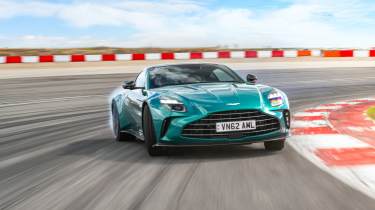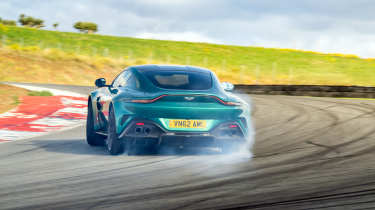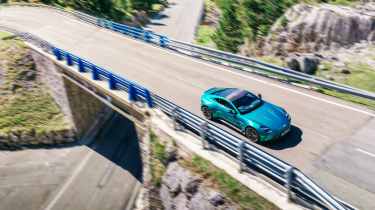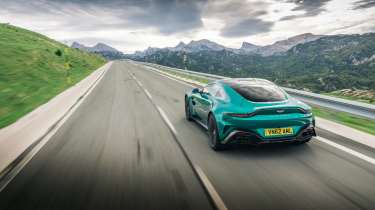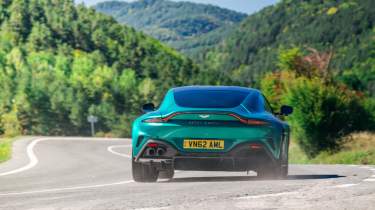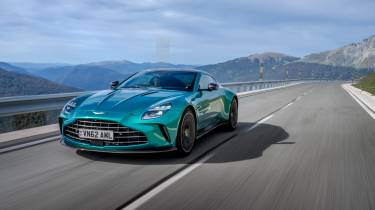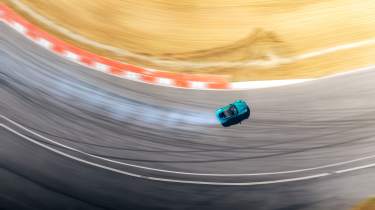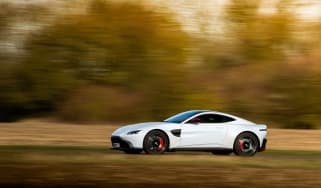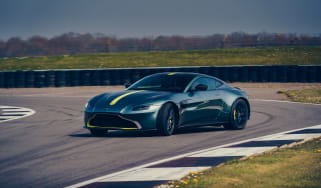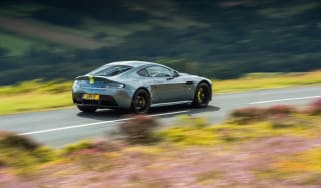Aston Martin Vantage 2025 review – a genuine McLaren Artura rival?
Aston Martin’s new Vantage has been beefed up to take on supercars as well as sports cars. Can it take the fight to McLaren and Porsche?
There are some big numbers associated with the 2025 Aston Martin Vantage. Really big. 656bhp. 590lb ft. 202mph. And a £165,000 entry price, taking this once-junior Aston into thoroughly senior territory. Is this a by-the-numbers car, though? An injection of power and torque to grab the headlines, a spring clean for the interior, neat facelift on the outside, and that’s as far as it goes? Or could it be one of the best Aston Martins? Our initial encounter with the car, as well as time getting to know it during our evo Car of the Year 2024 test, would certainly indicate as much. For one of our judges, it was an outright winner, while it rested on the podium for two others.
evo’s first briefing on the car suggested Aston Martin’s engineering team had been given the freedom – and the budget – to make this renewed Vantage the very best it can be. Not so much renewed as reborn. As we were talked around the car by director of vehicle performance Simon Newton and head of product strategy Alex Long, you can sense their pride in the car. This has clearly been a No Compromises project, with practically every area reconsidered and rehoned.
More reviews
And, encouragingly, despite the attention-grabbing numbers, there’s been just as much toil over making it fun and engaging at regular road speeds as there has into reaching numerical performance metrics. ‘This is the most agile, precise, dynamic, enjoyable sports car we’ve ever done,’ Long says with conviction. ‘In benchmarking, you find a lot of cars don’t come alive until you’re going really quick,’ adds Newton. ‘Dexterity and feedback at low speed, too, have been key for this car.’
Changes beneath the surface encompass structure, suspension, powertrain, electronic architecture and far more besides, but suffice to say they go much further than a skin-deep facelift. And for what it’s worth, to my eyes at least, the Vantage’s new skin looks fantastic. This isn’t a design website, of course, and you’ll make your own judgement, but in real life even more than in pictures, I find the Vantage a compelling thing to behold.
The hard points haven’t changed from the previous car, launched in 2018. That car always had a lovely profile and proportions, but the details are sweeter now. Whereas the older car’s narrow headlights looked a bit like they were squinting into the sun, the new, larger lamps help to visually balance the new, frankly gigantic grille.
There’s a lot of it because the muscled-up powertrain demands so much cooling performance. It’s almost too big for visual balance but it brings to mind Aston Martin Zagato specials, and you now read it as one entity where the older car’s more progressive grille design gave the Vantage the impression of a mouth without a lower lip. The new cooling gills either side mildly echo the old Aston Martin One‑77 and balance the new car’s extra width: it’s a full 30mm wider than before.
While the rear lights and the bodyshell’s essential shape remain the same, practically every panel has changed. And it’s the same story inside. Here it’s a big step on from the previous car: more attractive, higher-quality in feel and with a vastly more up-to-date media and screen interface, the same system that you’ll find in the DB12 and now the updated DBX too.
Happily there are still physical switches too, but much more attractively laid out than before, with lovely textured rollers for stereo volume and air-con fan and temperature settings for driver and passenger. ‘The industry is reaching “peak screen”,’ Newton acknowledges, ‘so we’ve designed the interface so that you can drive it on the switches too.’ There are buttons too to toggle between modes for the adaptive dampers and active exhausts, and you put the car into drive via a trad selector now, rather than the old separate P, N, D and R buttons.
This has helped tidy the dashboard up, and a smart horizontal trim-line runs through the middle of the dash. In this car it’s black carbonfibre, but you can choose all kinds of coloured finishes or Alcantara. In fact, there are seemingly limitless options for personalisation.
Though much of the cabin is new, the spacing between steering wheel, hip point and pedals is the same as before, and you settle into a true, low-set, arms-and-feet-ahead front-engined sports car driving position.
Over-the-air updates will help keep the infotainment up to date; perhaps for the best as we haven’t found it the most intuitive system in the DB12. As to how useable it is on the road in the Vantage – well, let’s find out. The engine fires via a large starter button in the middle of the centre console, as per the DB12, and you twist the button’s surrounding collar in neatly tactile clicks to select which drive mode you’d prefer. The 4-litre twin-turbo engine growls into a muscle-car-esque wub-wub-wub at idle.
The massive increase in power (153bhp over the old Vantage, and 129bhp over the more powerful F1 Edition) is a statement, positioning the car above the likes of the new AMG GT and Porsche 911 Turbo S and helping to justify its new price point. The turbos, heads, cams, inlets, exhausts – the block, even – are new compared with the previous Vantage. ‘We effectively had free rein to select what we wanted from AMG,’ explains Newton.
It’s perfectly docile and tractable at regular road speeds, although trickling through narrow, unsighted rural roads, the new Vantage does feel wide. In fact overall width between the mirrors (suspended on neat, blade-like armatures) is the same as the previous car, but the new body occupies more road than before. However, unlike the DB12 which, for me, takes a little time to feel at ease with, the Vantage psychologically shrinks around you much more quickly. It’s a wieldy car, and – crucially – the feel and feedback through the steering wheel, and the chassis itself, is full of clarity.
Aston Martin has retuned the power steering and re-engineered the steering column, as well as going to great lengths to stiffen the car’s structure at strategic points, with one of the benefits being on-centre steering feel. ‘Often difficult to get with a sporty tyre,’ Newton observes, and the Vantage now wears decidedly sporty Michelin Pilot Sport S 5 rubber, in a bespoke specification for the car with Aston Martin markings. (They’re 21 inches in diameter, up an inch from before.
In fact they’re the same 275 front/325 rear size as you’ll find on the DB12, but different compounds.) You can feel the effect of that work: there is lovely, consistent response and weighting to the Vantage’s wheel, whether lazily sketching through gentle turns or loading it up through a tighter corner with intent.
Brake feel is great, too. You can spec cast-iron or carbon-ceramic brakes (the latter are fitted here), and each system gets its own bespoke servo for the best possible brake feel.
One thing I’m feeling perhaps a little too much is the road surface itself: the Vantage puts you in touch with it in detail, as discussed, but the ride is pretty darn firm. There are some very rough roads as we head further into the hills – pockmarked and potholed enough to rival UK tarmac, in fact – and the Vantage’s low-speed ride on rough surfaces and secondary ride at a cruise is rather more fractious than you might expect from its suave appearance.
It gets better with speed, however: the quicker you go, the more lithe and supple the Vantage becomes. As the roads climb into remote hills, they become all but deserted, bar the scudding shadows of birds of prey wheeling above. The tarmac here is smoother too, and as we up our pace, I find myself clicking the drive mode dial to Sport+ to firm the dampers up slightly and further tighten the Vantage’s already deft body control.
Tackling these roads’ long, well-sighted bends at speed, you feel the car settle and squat slightly in the first phase of the corner, before adopting a stable pose. A controllable one, too. Front-end grip is mighty, and the rear follows beautifully. If space, vision and desire allow, you can also steer the car on the throttle.
I’d worried that the new, gargantuan power output might actually be the undoing of the Vantage rather than the making of it. Not because it would make it a wild animal to drive, but because I wondered if Aston might need to limit its torque delivery to keep the Vantage tamed. Driving the DB12 Volante recently (in admittedly un-grippy weather conditions), it often felt as if its slightly greater power and identical torque output to the Vantage were being electronically damped-down; it was rarely possible to actually feel the engine’s full sweep of performance unless you turned everything off – something you might not always wish to do on the road. A less powerful car that you can truly extend on the road is often more fun than one that can’t be fully uncorked.
The Vantage is different to the DB12. Despite its Mr Universe levels of might, its malleable level of traction and clear communication mean that very often you really can put all that torque down to the road. The road in this case, admittedly, being smooth, sun-baked Spanish tarmac. New for this Vantage is multi-level traction control, with steps from 1-8 (the higher the number, the less the assistance).
It’s intended for the track more than the road, but so confidence-inspiring is the handling and feedback, it feels rude not to employ it here too. In its higher numbers, it gives you a remarkable amount of movement before smoothly, almost imperceptibly, intervening.
The Vantage is fast, of course. Very. The eight-speed ZF automatic transmission (sadly, but predictably, there’s no manual option) has the same ratios as before but a five per cent shorter final drive for even more urgent acceleration, and yet the gears are still long enough, and the engine flexible enough, for third and fourth gear to be enough to take apart a B‑road. Left to its own devices, particularly in default Sport mode, the gearbox is desperate to change into a higher gear as soon as possible, presumably to save fuel. (The DB12’s the same.)
So very soon you find yourself reaching for the ‘Manual’ button behind the gear selector – a bit of an awkward stretch while driving – to lock it in manual mode. The shift paddles have been relocated from the steering column to the back of the wheel itself, partly because that’s Newton’s personal preference, and it works perfectly well; the steering is quick enough that your hands are rarely repositioned, even in tight turns. The new touchscreen, as on the DB12, is still a faff, unfortunately. Although it’s attractive, the text is optician-eye-test tiny, and it’s laggy. Hopefully it will improve with future updates.
You can ramp up the exhaust’s volume and allow more V8 bombast into the cabin in three stages, via a button on the centre console, but even in its quieter mode this is still a pretty noisy car. To the point, in fact, where the engine’s volume can become a bit tiring at a cruise. Sounds fantastic from the outside, though: a Vantage drive-by sounds like a WW2 Spitfire flying past at low altitude.
> Aston Martin Vanquish 2024 review - Britain’s Ferrari 12 Cilindri rival
That’s the case at the Monteblanco racetrack, our journey’s end, where a pair of Vantages thunder past on the other side of the pitlane. Here we’re switching into an identical Vantage, albeit with the optional carbonfibre sports seats. These look stunning, although I’ll find that, like the regular seats, they don’t quite support my upper body as firmly as their bucketed shape suggests; they’re possibly designed for drivers in the upper percentiles of torso size.
We have the circuit to ourselves, to do what we want: fast laps, slow laps, static pictures, smoky sideways stuff. Ordinarily, track time on a car launch is limited to a handful of supervised laps, and this level of freedom to give the Vantage a bit of a pasting says a lot for Aston Martin’s faith in the car. Especially as Monteblanco is a relatively punishing track with big braking areas and a mixture of tyre-torturing low-speed corners and big-speed, big-momentum high-speed sections.
This is not a trackday car; it’s not the sort of machine we’d slot into the evo Track Car of the Year test elsewhere in this issue. And yet it feels brilliant around here. You can leave your braking last-gasp late from 160mph or so for the tight Turn One and both stopping power and pedal feel are superb. After a few quick laps the brakes do start to fade, but this is a road car after all, and while it’s not an ultra-heavy car, nor is it a super-light one: Aston Martin quotes 1670kg to our preferred DIN standard.
But what’s most impressive is its balance. We’ve set the driving mode to Track, which further firms up the dampers and relaxes the stability control, but to really understand whether 656bhp is truly controllable in the new car, we need to then hold a button to engage the adjustable traction control. It defaults to five out of eight, a mode that’s very safe on this dry track. Six allows a good deal of movement, and seven even allows big slides, but eight is hilarious: you can achieve ridiculous angles and still recover the car smoothly.
The Vantage has adopted Bosch’s ‘feed-forward’ dynamic software, integrating with the steering, brakes, e-diff and so on to predict the driver’s intentions before actuating a response. So subtle is the stability control’s intervention that you can quickly fool yourself into thinking you’re doing all the work yourself. It’s immensely flattering.
Switching everything off demonstrates this: suddenly you need much faster hands and much quicker reflexes to catch and hold the Vantage in a slide. And yet, it’s still brilliant. I’m far from God’s gift to drifting, but the Vantage can be introduced into a slide in such a precise way and then straightened up in an unusually controllable fashion. It’s anything but snappy. It’s… malleable, that’s the word. Newton confirms that a key attribute the team worked on – and collaborated with Michelin on, too, when it came to the rear tyres’ characteristics – was transparency at the limit, and how smoothly the car gets out of a slide as well as gets into one.
The e-diff is the same unit as before but with the new, faster, software and integration with the feed-forward system, it speaks more fluently to the rest of the car’s electronics and it hooks up beautifully both on the circuit and on the road.
> Aston Martin confirms 1064bhp Valhalla for 2025 launch
And if 656bhp might seem like overkill on paper, it’s very useful when evo senior photographer Aston Parrott is demanding that you get the car a bit more sideways, for a bit longer, at a slightly higher speed next time. Peak torque that’s spread broadly all the way from 2000 to 5000rpm helps, too.
I know how this sounds. Jammy journalist gets to drift around on an empty racetrack, has a lovely time and declares car brilliant. But not many cars are as intuitive as this to manipulate at and beyond the limit, which speaks volumes. And, a little mild brake-fade aside (which isn’t unusual), the car’s stamina is impressive. Although we did voluntary cool-down laps, it worked hard, for a long time, with minimal time for rests and check-overs between stints on track.
Behind all those square inches of grille surface there are twin stack coolers, the better for track work. Aston Martin says that the Vantage can sustain the same performance on track as the previous car in 10deg C higher ambient temperatures.
It underlines the attention to detail you sense has been lavished on this car. And that this is anything but a by-the-numbers car. Two days with the new baby Aston, on road and track, have demonstrated it’s a car about feel, feedback and carefully resolved details. Those numbers give it the headline attraction it needs to justify its new market positioning. But it’s more than a Top Trumps card on wheels. Whether it’s a better one than its rivals will have to wait for the group test, but it is a truly compelling alternative to the likes of the new AMG GT and the Porsche 911 Turbo S. Subjectively and objectively, this is a fun car, and a desirable one. Bravo, Aston. Proper job.
To verify the new Vantage’s supercar-baiting chops and, indeed, its brilliance as a whole, we had it on our 2024 evo Car of the Year roster. Tested on road and track, we put Aston’s not-so-baby brawler up against a bonafide supercar in the form of the McLaren Artura Spider, the drum-tight sports car that is Porsche’s 911 S/T, and many more contenders for the eCoty crown. Here’s our concluding verdict.
evo Car of the Year 2024 verdict, John Barker
Aston’s offerings get better and better and the new Vantage, with its fabulous styling and fabulous performance, was Stuart Gallagher’s outright winner and a podium finisher for James Taylor and Richard Meaden. ‘It has colossal performance but that doesn’t define the car,’ said Gallagher. ‘Digging into the torque rather than revving it out for power, you can still revel in the clarity of its steering and dynamics. It’s like a front-engined 911, the way it instils relaxed confidence.’
High praise and Taylor was a big fan too. ‘Every time I drove it I had a huge smile on my face. Love its muscle car/hot rod character, how positive its front end is and how smoothly – most of the time – it gets into and out of oversteer. I just wonder if the ride may be a bit too brittle for UK roads.’
Henry Catchpole and I were wowed but felt it needed a bit more feedback. ‘The steering lacks ultimate feel,’ said Henry, ‘and you don’t get the nuanced flow of the more supple cars.’ I found the same in the rain, where the steering felt too bright and I didn’t know when the grip was going to run out.
Meaden, however, loved it. ‘The most exciting car for me. Takes a little while to fully get to know it, but the rewards are ample when you do. Moves the game on for Aston in fine style.’
2025 Aston Martin Vantage specs
| Engine | V8, 3982cc, twin-turbo |
| Power | 656bhp @ 6000rpm |
| Torque | 590lb ft @ 2750 – 6000rpm |
| Weight | 1605kg (dry) |
| Power-to-weight | 415bhp/ton (dry) |
| Tyres as tested | Michelin Pilot Sport S 5 |
| 0-62mph | 3.5sec |
| Top speed | 202mph |
| Basic price | £165,000 |
